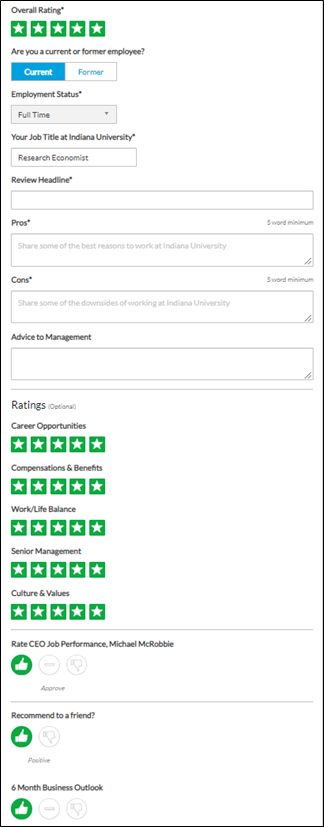Indiana's most satisfying occupations: Exploring Glassdoor data for insight

With fast-changing work environments and a constantly evolving economy, we should take time to ask ourselves what brings us satisfaction.
Nowadays, consumers share their opinions of restaurants and services on social media such as Yelp, and workers can share their job satisfaction online too. Glassdoor is one such way for workers to share their reviews. Glassdoor provides an online ratings tool based on employees' satisfaction scores.
Job seekers can use those job satisfaction scores to make decisions on which companies they would most want to work for, which has become a critical facet of talent attraction during these times of a very tight labor market.
So what does job satisfaction look like in Indiana? In this article, we used a sample of Glassdoor's job satisfaction ratings for Indiana occupations to check out which jobs Hoosiers might be finding most “satisfactory.”
Objectively speaking, money and stability give a great view of a job’s success. However, as the popular Easterlin Paradox theory goes, an increase in standard of living does not directly correlate to happiness. Now, the Indiana Business Research Center (IBRC) has begun experimenting with subjective ratings—what Hoosiers truly think about their jobs—using Glassdoor survey data.
Accurately gauging how employees view and perceive their jobs is entirely subjective and difficult. Glassdoor, an anonymous firm survey website, allows any user to freely review their firm. Anonymity gives the platform a “non-biased” subjective score of a firm. There are many categories that Glassdoor uses to display an overall rating. A user is asked to rate the following categories on a scale of one to five: Overall Rating, Career Opportunities, Compensation & Benefits, Work/Life Balance, Senior Management, and Culture & Values (see Figure 1).
Figure 1: Glassdoor survey questions

Source: Glassdoor website
After several data processing steps to bridge the gap between Glassdoor job titles and their appropriate 6-digit Standard Occupation Classification (SOC) codes, we found which occupations Hoosiers wrote about the most on Glassdoor in Indiana (see Table 1).
Table 1: Top contributors on Glassdoor
| SOC code | Occupation title | Percentage |
|---|---|---|
| 39-1021 | First-line supervisors of personal service workers | 5.5% |
| 43-4051 | Customer service representatives | 4.6% |
| 41-2031 | Retail salespersons | 4.4% |
| 43-5081 | Stock clerks and order fillers | 3.6% |
| 15-1199 | Computer occupations, all other | 3.4% |
| 41-4011 | Sales representatives, wholesale and manufacturing, technical and scientific products | 3.1% |
| 41-2011 | Cashiers | 2.3% |
| 29-1141 | Registered nurses | 2.0% |
| 11-1021 | General and operations managers | 1.7% |
| 11-1021 | Managers, all other | 1.6% |
Source: IBRC, using Glassdoor data
Table 2 lists the occupations Hoosiers think are most satisfying.
Table 2: Most satisfying occupations (as rated by Hoosiers on Glassdoor)
| SOC code | Occupation title | Average wage |
|---|---|---|
| 11-1011 | Chief executives | $148,730 |
| 19-4061 | Social science research assistants | N/A |
| 25-1191 | Graduate teaching assistants | $40,140 |
| 17-3011 | Architectural and civil drafters | $54,080 |
| 21-1012 | Educational, guidance, school and vocational counselors | $51,560 |
| 43-3051 | Payroll and timekeeping clerks | $40,720 |
| 41-9021 | Real estate brokers | $83,090 |
| 19-3051 | Urban and regional planners | $56,800 |
| 25-2022 | Middle school teachers, except special and career/technical education | $52,690 |
| 11-3131 | Training and development managers | $90,100 |
Source: IBRC, using Glassdoor data
The methodology we used has some caveats. One caveat is that while the Glassdoor platform is seen as non-biased, the self-reporting system itself may result in biased opinions. Because self-reporting is not distributed equally to all job employees, there are missing ratings on some SOC codes. The failure to observe all SOC code ratings will not give us an accurate conclusion and should be used with caution. Another caveat is the accuracy of the OccuCoder match to Glassdoor job titles. (OccuCoder is an automatic query that reads text files to fuzzy match with complete SOC codes descriptions.) Although this is an advanced tool to closely match any job title, misspellings or misleading job titles may lead to mismatches during the process. This could result in skewed or biased conclusions. Thirdly, Glassdoor ratings may have more to do with employer satisfaction than occupation satisfaction—an employee may have dissatisfaction or satisfaction toward his or her employer but not necessarily toward the occupation itself. One may be very satisfied in what he or she is doing despite dissatisfaction with an employer or company.
Despite the caveats, the attempt to bridge the gap between objective and subjective is worthwhile and should be further explored in job satisfaction studies. Many studies have found that high-paying jobs do not lead to more happiness, and that other subjective values in jobs bring an immeasurable sense of achievement and contentment in people's lives. With fast-changing work environments and a constantly evolving economy, we should take time to ask ourselves what brings us satisfaction.
